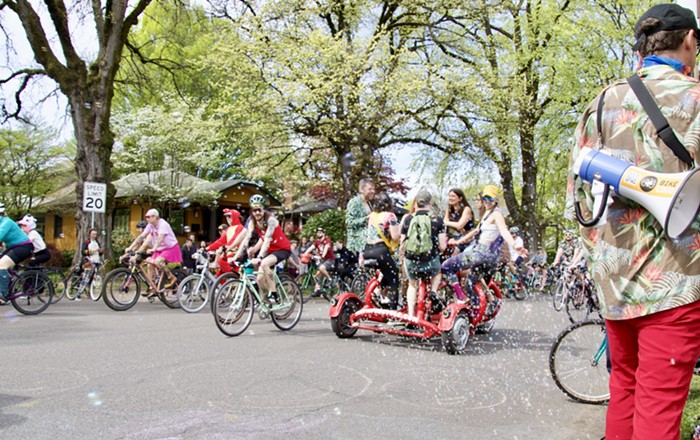
- Images courtesy of Spinlister and Pronto Cycle Share
- Which would YOU rather rent?
For years, Portlanders have bemoaned the city's inability to get bike share going. Now it looks like we may have two systems piling on top of each other within a year, and officials are wondering how it'll play out.
Back in March, the company Spinlister announced it's going to drop a brand new kind bike share offering on Portland this fall. The company's existing model has allowed people to rent their personal bikes to other users for years. Now, Spinlister's got another notion. Beginning in September, it's going to front specially designed "smart bikes" to willing users, who will rent out the bikes until they're paid off—then do whatever they want with them.
"We chose Portland because we have a very strong community in Portland," Spinlister CEO Marcelo Loureiro told the Mercury in April. "They are super engaged."
With the pilot project, Portland will have a shot at a model that's never been tried before. It'll begin with around 100 bikes, Loureiro says, and scale up to between 500 and 1,000 bikes by spring. Here's a rundown:
Loureiro—and pretty much everyone else who describes the model—winds up at an inevitable comparison with Car2Go. And while that's apt, it's also not quite right. The system Spinlister envisions doesn't involve the company owning its own massive fleet, which would have to be managed, and moved, and repaired. Rather, it would allow individuals to start their own fleets, as small as one rental bike, and work to make the model profitable.
Those owners would have two years to pay off the $800 price of each bike at rental rates of $2/hour, $20/day and $100/week, Loureiro says. It'd be up to owners to track the bikes—moving them from unprofitable parts of town if need be (users may get credits for parking them in accessible areas), and dealing with the headache of inevitable thefts. The bikes, as marketed, have wimpy chain locks, though Loureiro says GPS capabilities may deter thieves.
"They probably will [be stolen]," he says. "We're going to learn a lot from the pilot."
It's a very compelling idea, and, according to Loureiro, it's raised hackles in city hall. He says one of his employees was contacted shortly after Spinlister unveiled the plan.
"Someone from the city approached him and said they were going to launch the Portland bike share in March and we totally screwed their news," Loureiro tells the Mercury. He says the city's also talking about how it might regulate the new system once it gets underway.
The Portland Bureau of Transportation confirms half of that story. Spokesman Dylan Rivera says no one at PBOT's mad about Spinlister's proposal.
"We think it'd be great if there's Spinlister system and our system," Rivera says. "It's great to have more options for the public."
But Rivera acknowledges that the city's taking a hard look at the Spinlister model, and wondering if it needs to enact rules specific to the company's incoming rental-bike owners.
"The only concern we have is if they're going to have private transactions in the public right-of-way," Rivera says. "We need to learn more about what their plans are before we can know what those issues might be."
It'll be interesting, of course, to see if the city's able to swing a March bike share rollout as Loureiro says. Rivera's being cryptic about it. ("We may have [said March]. But right now all we're saying is 2016.") And if the city does get a system out in front of tourists and other potential users next year, it'll be doubly interesting to see whether Spinlister's more-nimble offerings win out over the plodding, highly visible bikes stationed around the center city.
"We know people have complaints about the traditional bike share," Loureiro says. "Their docks are ugly. The bikes aren’t that nice."













